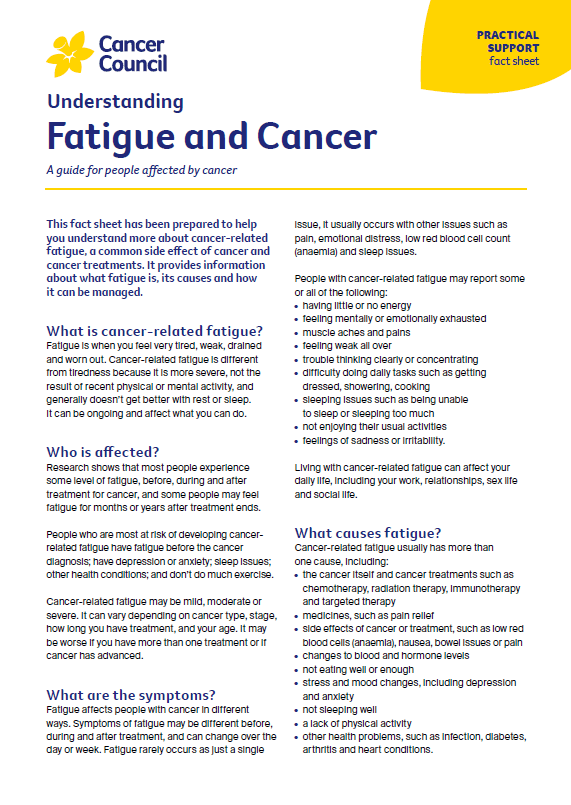- Home
- About Cancer
- Managing side effects
- Sexuality, intimacy and cancer
- Overcoming specific challenges
- Fatigue
Fatigue
It’s common to feel tired and lack energy during and after cancer treatment. This can continue for weeks or months, and varies from person to person. You may lose interest in sex or need to take a less active role. Your partner may be tired, which can impact their libido.
Tips for managing fatigue
- Regular light to moderate exercise has been shown to reduce fatigue. Even a walk around the block can help. An exercise physiologist or physiotherapist can suggest exercises that are right for you.
- Plan ahead. Rest before having sex.
- Use memories and fantasies, or erotic material to spark your interest.
- Try to be intimate at different times of the day.
- Speak to an occupational therapist, cancer support nurse or a Cancer Council 13 11 20 consultant about ways to manage fatigue.
- Spend time being affectionate with your partner – hugging, kissing and holding hands are all ways of feeling close when you’re too tired for sex.
Podcast: Managing Cancer Fatigue
Listen to more of our podcast for people affected by cancer
More resources
Dr Margaret McGrath, Head of Discipline: Occupational Therapy, Sydney School of Health Sciences, The University of Sydney, NSW; Yvette Adams, Consumer; Dr Kimberley Allison, Out with Cancer study, Western Sydney University, NSW; Andreea Ardeleanu, Mental Health Accredited Social Worker, Cancer Counselling Service, Canberra Health Service, ACT; Kate Barber, 13 11 20 Consultant, Cancer Council Victoria; Dr Kerrie Clover, Senior Clinical Psychologist, Psycho-Oncology Service, Calvary Mater Newcastle, NSW; Maree Grier, Senior Clinical Psychologist, Royal Brisbane and Women’s Hospital, QLD; Mark Jenkin, Consumer; Bronwyn Jennings, Gynaecology Oncology Clinical Nurse Consultant, Mater Health, QLD; Dr Rosalie Power, Out with Cancer study, Western Sydney University, NSW; Dr Margaret Redelman OAM, Medical Practitioner and Clinical Psychosexual Therapist, Sydney, NSW; Kerry Santoro, Prostate Cancer Specialist Nurse Consultant, Southern Adelaide Local Health Network, SA; Simone Sheridan, Sexual Health Nurse Consultant, Sexual Health Services – Austin Health, Royal Talbot Rehabilitation Centre, VIC; Prof Jane Ussher, Chair, Women’s Heath Psychology and Chief Investigator, Out with Cancer study, Western Sydney University, NSW; Paula Watt, Clinical Psychologist, WOMEN Centre, WA.
View the Cancer Council NSW editorial policy.
View all publications or call 13 11 20 for free printed copies.

